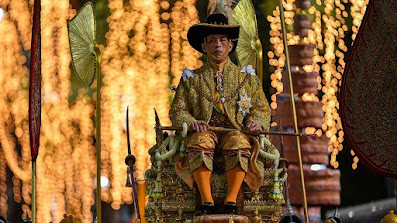
Thailand's King Maha Vajiralongkorn, seen here in December 2019, reportedly returned to Germany on a Thai Airways flight Nov. 8. © Reuters
TURBULENT THAILAND
Thailand king returns to Germany for first time in 13 months
King Vajiralongkorn expected to stay for a few weeks in Bavaria: sources
JENS KASTNER, Contributing writer
November 11, 2021
Nikkei Asia
HAMBURG, Germany -- Thailand's King Maha Vajiralongkorn was spotted in Germany for the first time since October 2020, a visit that comes amid yearlong protests in the kingdom by younger citizens demanding monarchy reform.
The 69-year-old king went to Germany on a Thai Airways International flight Monday, according to a report Wednesday by top German tabloid Bild.
The king presumably is at his villa in Germany's southeastern town of Tutzing, Bavaria. He is expected to stay for a few weeks in Bavaria, according to sources who requested anonymity. The reason for his visit is unclear, but believed to involve the upcoming start of the ski season.
King Vajiralongkorn returned from Germany, where he had long resided, in October 2020 to mark the fourth anniversary of his father's death. The monarch had not left Thailand since. His previous visits home usually lasted less than 24 hours.
In Bavaria, local media liaising with Nikkei Asia were unaware of the king's travel plans prior to his arrival. But they noticed in June that a villa was being renovated for him in Tutzing, which would make it the second villa the king owns in that town.
HAMBURG, Germany -- Thailand's King Maha Vajiralongkorn was spotted in Germany for the first time since October 2020, a visit that comes amid yearlong protests in the kingdom by younger citizens demanding monarchy reform.
The 69-year-old king went to Germany on a Thai Airways International flight Monday, according to a report Wednesday by top German tabloid Bild.
The king presumably is at his villa in Germany's southeastern town of Tutzing, Bavaria. He is expected to stay for a few weeks in Bavaria, according to sources who requested anonymity. The reason for his visit is unclear, but believed to involve the upcoming start of the ski season.
King Vajiralongkorn returned from Germany, where he had long resided, in October 2020 to mark the fourth anniversary of his father's death. The monarch had not left Thailand since. His previous visits home usually lasted less than 24 hours.
In Bavaria, local media liaising with Nikkei Asia were unaware of the king's travel plans prior to his arrival. But they noticed in June that a villa was being renovated for him in Tutzing, which would make it the second villa the king owns in that town.

A royal dog caretaker was spotted at Hilton Hotel Munich Airport on Nov. 8.
The king's visa for Germany drew intense media coverage and political attention in the country last year. Questions were raised over whether he was conducting Thai state affairs from German soil, which would be a breach of German law, and whether he owes Bavaria and Tutzing any inheritance and property taxes.
But the issue has lost prominence this year. German politics have focused on the country's election held in September, which the ruling Christian Democratic Union under Chancellor Angela Merkel lost. The center-left Social Democratic Party, the Greens and the pro-business Free Democratic Party are negotiating to form a coalition government that likely will see the foreign ministry led by the Greens.
Prior to the election, the Greens were vocal in criticizing Merkel's government as too soft regarding King Vajiralongkorn, so he might find the current state of political limbo beneficial for his travel plans.
It remains unclear how the king entered Germany in conformity with COVID-19 regulations. Berlin has categorized Thailand as a high-risk area since August, which means the king would be subject to a quarantine of at least five days unless he shows proof of recovery from COVID-19 or completed inoculation with a vaccine recognized in the European Union.

Thai King Maha Vajiralongkorn often resides in this villa in Tutzing, Germany. © Reuters
Chinese vaccines are not recognized, and issues could arise even with a Western vaccine brand if it was produced in Thailand.
The inoculation status of the king's daughter, Princess Sirivannavari, reportedly nearly triggered a diplomatic crisis between France and Thailand earlier this year. France refused to recognize her inoculation with AstraZeneca doses that apparently were produced by Siam Bioscience, AstraZeneca's production partner in Thailand. Sources said the problem was solved only after it was established that her shots were from AstraZeneca's South Korea stock, which France recognizes.
King Vajiralongkorn's father, King Bhumibol Adulyadej, did not leave Thailand at all after 1967, apart from a fleeting visit to Laos in 1994, and for many decades he spent eight months of the year outside the capital moving among four provincial palaces.
Critics and analysts attributed King Vajiralongkorn's unusually long stay in Thailand to the palace seeking to calm the protests demanding monarchy reform and the revocation of the "Article 112" lese majeste law, which carries a penalty of up to 15 years in prison. The youth and pro-democracy demonstrators have staged protests since last year, drawing up to tens of thousands of people. Momentum for the protests has slowed since key leaders were charged under Article 112, though sporadic protests continue in Bangkok.

.jpg)





